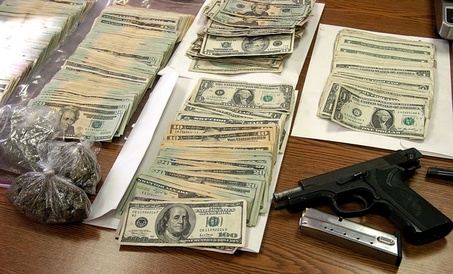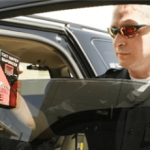Forfeiture of Cash, Property and Other Assets for Drugs and Controlled Substances in Wayne County
 The provisions of MCL 333.7521 require some explanation. My notes below appear in bold explaining the statutory language or you can read the statutory language without notes here. And if you think that forfeiture laws need to be changed even half as much as I do, you can find out who your local representative is by going here and here for your state senator. Write them angry letters, persistent letters or pleading letters to let them know that forfeiture laws need to be drastically changed! Tell them about this site so they can keep up-to-date on forfeiture news, so they can read about the horror stories that are literally coming out daily. You can also contribute to the Institute for Justice, which is a public policy institution that aims to challenge forfeiture laws through litigation, and I encourage you to contribute to the Criminal Defense Attorneys of Michigan, where I currently serve as president, as well as the ACLU of Michigan.
The provisions of MCL 333.7521 require some explanation. My notes below appear in bold explaining the statutory language or you can read the statutory language without notes here. And if you think that forfeiture laws need to be changed even half as much as I do, you can find out who your local representative is by going here and here for your state senator. Write them angry letters, persistent letters or pleading letters to let them know that forfeiture laws need to be drastically changed! Tell them about this site so they can keep up-to-date on forfeiture news, so they can read about the horror stories that are literally coming out daily. You can also contribute to the Institute for Justice, which is a public policy institution that aims to challenge forfeiture laws through litigation, and I encourage you to contribute to the Criminal Defense Attorneys of Michigan, where I currently serve as president, as well as the ACLU of Michigan.
-William Maze
333.7521 Property subject to forfeiture; imitation controlled substance defined.
Sec. 7521.
(1) The following property is subject to forfeiture:
(a) A prescription form, controlled substance, an imitation controlled substance, a controlled substance analogue, or other drug that has been manufactured, distributed, dispensed, used, possessed, or acquired in violation of this article.
If you have a fake or stolen prescription form or a controlled substance (whether real or not) that you received illegally, the form and the drug are subject to forfeiture. This is not surprising.
(b) A raw material, product, or equipment of any kind that is used, or intended for use, in manufacturing, compounding, processing, delivering, importing, or exporting a controlled substance, a controlled substance analogue, or other drug in violation of this article; or a raw material, product, or equipment of any kind that is intended for use in manufacturing, compounding, processing, delivering, importing, or exporting an imitation controlled substance in violation of section 7341.
If you have a drug lab, the equipment and raw materials are subject to forfeiture. Again, not very surprising.
(c) Property that is used, or intended for use, as a container for property described in subdivision (a) or (b).
If you have a container for hiding the drugs, raw materials, lab, etc., it is subject to forfeiture. This is not surprising, but what if a house "contains" drugs? Could a home be considered "a container" if it was found to contain unlawful narcotics? According to a 1986 decision from the Michigan Court of Appeals, the answer is no, but a 2002 decision brings this earlier decision into question. In 1986, the Court of Appeals held that:
[Th]e term "container" does not include something fastened to the earth such as a house. Webster's New World Dictionary (2d College ed), p 306, defines the term as "a thing that contains or can contain something; box, crate, can, jar, etc." Although the term embraces the concept of an object capable of holding another object, it is commonly understood to refer to a receptacle used to package or to ship articles and goods. Compare, 9 Words & Phrases, "Container," p 33 and pocket supp., p 20. We conclude as a matter of law that a house is not a "container" for purposes of this subsection.
People v 8120 Ravine Rd., 151 Mich App 358, 362 (1986), but look at Emmet County Prosecuting Atty. v Two Thousand Two Hundred Dollars in U.S. Currency (In re Forfeiture of 5118 Indian Garden Rd.), 253 Mich App 255 (2002), which is discussed below under MCL 333.7521(f).
(d) Except as provided in subparagraphs (i) to (iv), a conveyance, including an aircraft, vehicle, or vessel used or intended for use, to transport, or in any manner to facilitate the transportation, for the purpose of sale or receipt of property described in subdivision (a) or (b):
Here is where things get a little controversial. Prosecutors working in the Wayne County Forfeiture Unit use this section to make wild claims to support vehicle forfeitures. The statute seems to include any vehicle that is "used" or "intended" to be used to transport drugs, including more serious cases where the drugs are being transported for sale, but also including cases where some poor guy forgot that he left a Valium in his glove box or some kid has a little bit of pot in his father's car. The statute would include these less serious cases if not for the important, "EXCEPT AS PROVIDED IN SUBPARAGRAPHS (i) to (iv)" language that prosecutors intentionally ignore.
(i) A conveyance used by a person as a common carrier in the transaction of business as a common carrier is not subject to forfeiture unless it appears that the owner or other person in charge of the conveyance is a consenting party or privy to a violation of this article.
A common carrier is your local UPS driver and FedEx lady. If they deliver a big old box of cocaine to your home, the truck is not subject to forfeiture "unless it appears that the owner . . . is a consenting party." UPS and FedEx take drug delivery very seriously. If you think you might get away with using a fake name to deliver drugs via FedEx to a shady address, you are in for a very rude awaking. There are a litany of cases that deal with drug dogs and dog sniffs of packages delivered through common carriers, and all of those people were on appeal, post-conviction. Bottom-line: UPS and FedEx never consent to deliver drugs and actively work with the authorities to intercept these packages.
(ii) A conveyance is not subject to forfeiture by reason of any act or omission established by the owner of that conveyance to have been committed or omitted without the owner's knowledge or consent.
A vehicle is not subject to forfeiture if the owner can prove that he or she did not know about it or consent to it. This is known as the "innocent owner" exception. In Bennis v Michigan, 516 U.S. 442 (1996), a wife was a joint owner, with her husband, of an automobile in which her husband engaged in sexual activity with a prostitute. After the car was forfeited, she was provided no offset for her share of the car, even though she clearly did not consent to her husband consorting with prostitutes. The US Supreme Court decided the Bennis case claiming that Michigan did not have an innocent owner defense in the statutory language, and it is not clear whether this section of the statute was used or in effect at the time.
(iii) A conveyance is not subject to forfeiture for a violation of section 7403(2)(c) or (d), section 7404, or section 7341(4).
This section makes absolutely no sense unless you read the cited sections, and this the section that police and prosecutors actively ignore. Turning to "section 7403(c) or (d)" this statutory language prohibits (and makes it a crime) to possess LSD, peyote, mescaline, psilocybin, DMT, and marijuana. But, importantly, these are the exemptions to vehicle forfeiture. Section 7404 prohibits "use" of virtually any unlawfully obtained controlled substance, including all the really serious drugs. Finally, section 7341(4) exempts from forfeiture possession and use of an imitation controlled substance.
So, to recap: A vehicle is not subject to forfeiture for POSSESSION of LSD, marijuana, etc.; it is not subject to forfeiture for the mere USE of virtually any controlled substance; and it is not subject to forfeiture for the USE or POSSESSION of an imitation controlled substance.
(iv) A forfeiture of a conveyance encumbered by a bona fide security interest is subject to the interest of the secured party who neither had knowledge of nor consented to the act or omission.
If your vehicle is subject to forfeiture but you are still paying Ford Motor Credit, the lienholder gets paid first in line before the police and prosecutors get to take any money out of the auction proceeds. Usually this means that the police and prosecutor will not earn any money, so they are generally not interested in vehicles that are still owned by a creditor.
(e) Books, records, and research products and materials, including formulas, microfilm, tapes, and data used, or intended for use, in violation of this article.
All of the records regarding illegal drug transactions are subject to forfeiture, as if these are worth a penny.
(f) Any thing of value that is furnished or intended to be furnished in exchange for a controlled substance, an imitation controlled substance, or other drug in violation of this article that is traceable to an exchange for a controlled substance, an imitation controlled substance, or other drug in violation of this article or that is used or intended to be used to facilitate any violation of this article including, but not limited to, money, negotiable instruments, or securities. To the extent of the interest of an owner, a thing of value is not subject to forfeiture under this subdivision by reason of any act or omission that is established by the owner of the item to have been committed or omitted without the owner's knowledge or consent. Any money that is found in close proximity to any property that is subject to forfeiture under subdivision (a), (b), (c), (d), or (e) is presumed to be subject to forfeiture under this subdivision. This presumption may be rebutted by clear and convincing evidence.
This is another controversial portion of the statute. Essentially, this subsection claims that anything valuable near drugs can be seized by police and is subject to forfeiture. In other words, if you have a large amount of currency in your pocket near a controlled substance, the cash is subject to forfeiture. This is abused to the point of being absurd, and it compels the owner to rebut a presumption that the cash is subject to forfeiture by "clear and convincing evidence." Clear and convincing evidence is a very high burden of proof, just short of beyond a reasonable doubt. But what if there are no controlled substances nearby? Well, what stops police from claiming that they saw stems and marijuana seeds that were too small to test? And what if the trial court judge decides that there must have been drugs nearby because a drug dog "reacted" to the currency? While there is no law that prohibits a person from carrying large amounts of cash inside the boundaries of the United States, police and prosecutors make claims against currency all the time, and this corrupt system needs to be challenged. Bottom-line: They want your money, and you cannot prove you earned it legally. Incidentally, the British did this all time to American colonists, and it inspired a revolution. This is downright Anti-American, and it is evil.
Let's take greed a little step further and make it even more evil: Can't prosecutors claim that, if police find drugs in your home, your home is valuable? Yes. Yes they can. In one of the worst decisions by the Michigan Court of Appeals to open the floodgates on forfeiture, prosecutors were allowed to take away a family's most valuable asset. As the Court of Appeals held in 2002:
Under MCL 333.7521(1)(f), real property may be forfeited where there is a "'substantial connection' between the realty and the underlying illegal transaction." In re Forfeiture of One 1978 Sterling Mobile Home, 205 Mich App 427, 430; 517 NW2d 812 (1994), quoting In re Forfeiture of $ 5,264, 432 Mich 242, 262; 439 NW2d 246 (1989). The evidence in this case showed that McKenney had approximately seventeen pounds of marijuana located throughout the home. The police found records in McKenney's bedroom suggesting that approximately twenty-seven customers owed him approximately $ 20,000 for marijuana. An affiant stated that he purchased marijuana from McKenney over the course of several years and that the house in question was used for many of the transactions. Moreover, drug-packaging paraphernalia was found in the home. Under these circumstances, plaintiff established a sufficient connection between the home and underlying illegal transaction to warrant forfeiture. Indeed, the evidence showed that the home was used to store or distribute narcotics on a regular basis. See In re Forfeiture of $ 5,264, 432 Mich at 262-264, and In re Forfeiture of Mobile Home, 205 Mich App at 430-431.
Now, you might be tempted to say, "but these folks were clearly drug dealers!" Yes, they were, but the case is horrible because it subjected your home to forfeiture, and your neighbor's home to forfeiture, and everyone else's home. And remember, you must prove by clear and convincing evidence that the home is NOT subject to forfeiture. You have to prove that your own home is not subject to forfeiture, even if the government never brings a criminal complaint. A conviction is not required! And a criminal case is, likewise, not required! This case provided a financial incentive for police to lie and cheat in order to steal, and these dollars are buying new equipment, paying officer's overtime salaries, and providing the police with more resources to seize other people's property to raise revenue.
A client of our firm recently declared, "I support drug forfeiture laws because I think the government should go after drug dealers. But I'm innocent. I didn't do anything wrong." He was extremely upset to discover that he was not innocent until he could prove it. In fact, he was actually crying. He was crying because he actually did not do anything wrong, but he stood to lose everything or pay a substantial sum to prove his innocence with no guarantee that he would win. This is modern day America, and law-abiding citizens get caught up like innocent dolphins in tuna nets. The problem is that the government does not care one iota. They are carving up dolphin meat and selling it as tuna on the streets, encouraging their police forces to cast wider nets.
(g) Any other drug paraphernalia not described in subdivision (b) or (c).
A catch-all for "drug paraphernalia." Unimportant.
(2) As used in this section, imitation controlled substance means that term as defined in section 7341.
Again, unimportant.
As you can see from the above statutory language, the drug forfeiture statute is relatively benign, but it contains a couple of provisions that have been subject to widespread abuse. If you have been victimized by the Wayne County Forfeiture Unit, call our office as soon as possible so we can review your case. We can be reached at (734) 591-0100 (Livonia) or (734) 941-8800 (Romulus). Our toll free number is (888) 941-1122. Please take the time to call us because we really want to take a few minutes to discuss your case.





